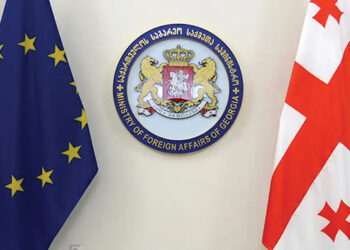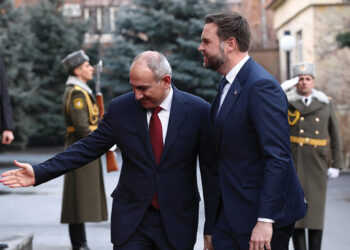Warsaw in October once again became a laboratory of pianistic precision. The XIX International Chopin Competition, marking the beginning of the centenary cycle, gathered the most accomplished generation of young pianists in history — musicians formed not only by conservatories but also by an economy of attention, where excellence has become both currency and pressure.
Among the eleven finalists stood the Georgian pianist David Khrikuli, 24, who performed the Concerto in F minor, Op. 21, and the Polonaise-Fantaisie, Op. 61. He did not receive any award, yet his name remains one of the few that transformed the event from a competition into a cultural question.
The Chopin Competition, founded in 1927, emerged from a distinctly modern impulse: to transform aesthetic judgment into measurable structure. It is the same century that built both the Olympic Games and the Nobel Prize — institutions of ranking, classification, and public verification.
Music, however, resists quantification. Its evaluation systems, even when codified into rubrics, always border on the speculative. This paradox defines every Chopin Competition: jurors measure what was never meant to be measured. The finalists — already laureates of other major contests — stepped onto the Warsaw stage as representatives of an international professional class. They demonstrated not development but consolidation. In this context, Khrikuli’s performance drew attention not for its virtuosity (a given at this level), but for the texture of his sound — inwardly shaped, consciously unpolished, more investigative than declarative. His phrasing suggested that music is not a product of the will to conquer, but of the will to understand.
In choosing the F minor Concerto, Khrikuli aligned himself with Chopin’s introspective side. This work, unlike the E minor, does not display orchestral grandeur; it is built on dialogue, chiaroscuro, the subtle distribution of weight between melody and harmonic shadow. The pianist’s task here is not projection, but articulation — to make audible the porous boundaries between thematic fragments.
The F minor is also a study in emotional asymmetry. Its harmonic rhythm — alternations between minor and modal light — creates a psychological texture closer to late Schubert than to public romanticism. For a pianist, this demands control of surface density: how much pressure the tone can sustain before losing translucency. Khrikuli’s reading emphasized inner rhythm rather than external pulse — a decision that, within the context of competition, can be misread as lack of clarity. Yet it is precisely through this slower breathing that Chopin’s syntax reveals its human dimension.
The Chopin Competition has always functioned as a sociological indicator of its era’s musical taste. In the 1930s, it rewarded romantic immediacy; in the 1970s, structural clarity; in recent decades, interpretive neutrality. Its current form reflects a broader cultural pattern: the valorization of coherence over individuality, precision over risk.
This is where the idea of “winning” becomes conceptually fragile. The premise of competition implies that music’s purpose is goal-oriented — that performance culminates in reward. Yet the creative act, especially in Chopin’s idiom, resists teleology. His music is circular, introspective, often suspended between emotional states. It ends not in resolution but in self-interrogation.
Competitions operate on intersecting psychological and economic logics. Psychologically, they exploit the human desire for comparative evaluation — the need to see oneself reflected in hierarchies. Pianists internalize this logic: preparation becomes strategic optimization, where risk is weighed against probable reward. Yet music thrives in indeterminacy; the more a performer adapts to predicted judgment, the more performance risks formulaic predictability. Khrikuli’s emphasis on interpretive depth over consensus reflects a rare awareness of this paradox: artistic impact cannot be calibrated to a scoreboard.
Economically, competitions function as career accelerators. Prizes open doors to recordings, festivals, and management contracts. Yet the visibility of reaching a final — particularly in a centenary edition drawing global attention — carries its own cultural capital. Audience reception, critical discussion, and digital amplification can produce trajectories as consequential as formal awards. Khrikuli’s “non-win” therefore produces a networked impact, confirming that influence in contemporary music is as much about ideas and interpretation as it is about medals.
The most telling aspect of this year’s edition is not the jury’s verdict, but the discourse it generated. Debates about Khrikuli’s omission indicate a shift from evaluating technical supremacy to questioning what kind of artistry matters. This aligns with research in aesthetic psychology, which finds that listeners respond most to controlled unpredictability — deviations in timing, timbre, and phrasing that signal authenticity. By this metric, Khrikuli’s performance situates him among the most cognitively engaging pianists, even as it deviates from the conventional rubric.
To reach the Chopin final is itself a rare form of validation. Beyond prizes lies cultural resonance — the ability to provoke reflection about the nature of musical value. Khrikuli’s interpretation reminds that the significance of a performance cannot be reduced to competition outcomes; the subtleties of phrasing, texture, and interpretive choice are themselves enduring contributions to the art form.
In this sense, Khrikuli embodies a broader truth about the contemporary musical ecosystem: artistic authority does not require a medal. The formal hierarchy of competitions maps only a fragment of influence. The true measure lies in how performances expand perception, articulate the instrument’s possibilities, and cultivate an intellectual and emotional dialogue between artist and audience.
His presence in Warsaw, in other words, produces knowledge: about Chopin, about pianistic technique, about the balance between interpretive courage and institutional expectation. That knowledge, though intangible, constitutes a form of triumph more enduring than a prize.
Review by Ivan Nechaev














